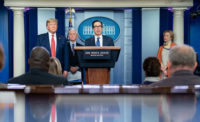Treasury Secretary Steven Mnuchin says another federal aid bill will be needed to help businesses and workers still recovering from the economic impact of the coronavirus pandemic.
Mnuchin, testifying at a Senate Small Business and Entrepreneurship Committee hearing on June 10, provided one of the strongest statements to date from the Trump administration about the likelihood of a further coronavirus aid package. [View webcast of hearing here.]
"I definitely think that we are going to need another bipartisan legislation, to put more money into the economy,” he said.
That legislation won’t come immediately, however, he indicated.
"We don’t want to rush into" a new bill, Mnuchin said, noting administration officials want to be "careful" in seeing that funds from the several measures enacted earlier are put to use in the economy. He indicated a time frame of about 30 days to develop the legislation.
Any new funding should be focused: “I think whatever we do going forward needs to be much more targeted," he said, "particularly to the industries and small businesses that are having the most difficulty in reopening as a result of COVID-19. We absolutely believe small businesses and, by the way, many big businesses in certain industries, are absolutely going to need more help," he said.
Stimulating hiring is a priority, said Mnuchin, who said that though the unemployment rate declined in May, it is still "too high."
He said the new proposal could include provisions to stimulate hiring in industries such as travel, hotels, leisure and restaurants.
Types of assistance might include tax incentives or assistance from the recently launched Paycheck Protection Program (PPP) of forgivable federal loans for small businesses and nonprofits.
Funding for state governments should be part of the package, too, Mnuchin later added.
In the House, Democrats last month pushed through a sweeping $3-trillion-plus aid package titled the Health and Economic Recovery Omnibus Emergency Solutions (HEROES) bill. It has a modest amount of construction-related funds but more than $900 billion in direct federal funding for states and local governments. [View 4/17/2020 ENR story here.]
There was next to no mention of construction in the hearing, except Mnuchin’s comment that the unemployment statistics released on June 5 showed a big increase in jobs in the industry.
Construction priorities
Industry groups have made clear their priorities in the hoped-for package.
For example, on June 5, a long list of construction, transportation and engineering groups, led by the American Association of State Highway and Transportation Officials, wrote to President Trump, urging him to support an "immediate $49.95-billion infusion" for state transportation agencies.
State DOTs are faced with a steep decline in transportation-related revenue, chiefly in motor-fuels taxes, because of the drop off in motor vehicle traffic in recent months.
The letter reiterates a proposal that AASHTO had put forward on April 6. The HEROES bill, which the House passed on May 15, has $15 billion for state DOTs.
PPP in review
Much of the Senate hearing dealt with the PPP, which Congress created in the Coronavirus Aid, Relief and Economic Security (CARES) Act. Trump signed the bill on March 27.
The law provided $349 billion for PPP, but all of that was exhausted in 13 days. That prompted Congress to provide an additional $310 billion for the program, in a bill enacted on April 24.
A follow-up bill providing more flexibility for loan recipients was signed on June 5. [View ENR 6/5/2020 story here.]
The program was constructed under severe pressure, as lawmakers sought to provide financial help as quickly as possible. But construction and other industries criticized PPP requirements, laid out in industry guidance. That led to a series of additions and clarifications to the guidance documents from Treasury and the Small Business Administration, which carried out the program.
Committee Chairman Mario Rubio (R-Fla.), a prime architect of PPP, said although the program had "some bumps along the road," it has been an "extraordinary success." Rubio said PPP had "saved millions of jobs."
SBA reported as of 5 p.m. June 9, it had approved $511.4 billion in PPP loans, leaving a balance of $148 billion.
Democrats' new PPP proposal
Some in Congress want to make additional modifications to PPP. The committee's top Democrat, Ben Cardin (Md.) and fellow Democrats Jeanne Shaheen (N.H.) and Chris Coons (Del.) on June 10 said they plan to introduce a bill providing new funds for PPP that would go to businesses with 100 or fewer workers and which have seen revenue drop by 50% or more due to the virus.
Companies also would have to have borrowed from PPP and spent all of those funds or be on track to do so. The senators' statement didn't specify how much funding their proposal would entail.





Post a comment to this article
Report Abusive Comment